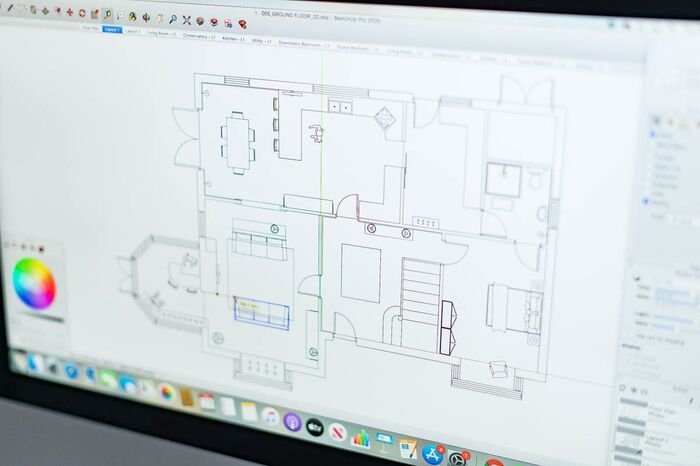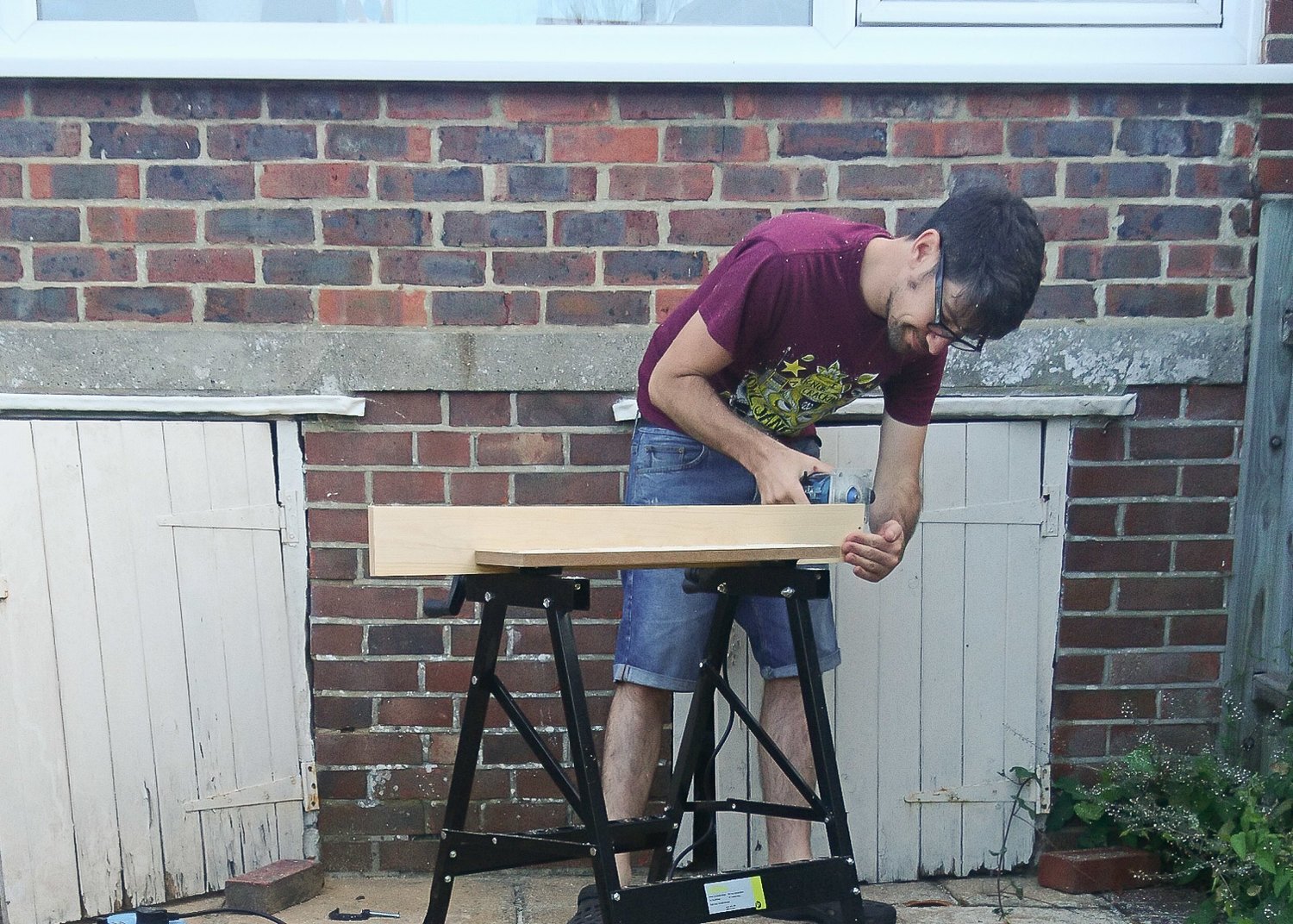How to renovate in the cost of living crisis
/
Anna Whitaker
Property flipper and design enthusiast with an eye for thoughtful and financially savvy spaces
I had a little shock when our energy bill went out this month.
It’s not like I’d been hiding under a rock, but all the talk of the cost of living crisis really just felt like that. Talk.
So when reality kicked in, it was much harder to ignore.
As a self-confessed daydreamer with my sights constantly set on our next renovation project, it was time to sit down and work out the impact this economic period is about to have, not just on the nation, but on individuals with mortgages to pay, mouths to feed and plans to renovate.
Here, you’ll find a bunch of ideas to keep costs down if the latter is playing on your mind.
Reconsider the scope
I’m going in strong with tip number one, but is now really the time to prioritise your renovation? With spiralling mortgage rates and utilities through the roof, it’s definitely worth sitting down and getting a pen and paper out for this one:
What’s your real financial position?
Are you sure you can drop £25k on that dream kitchen?
How long will you stay in your current home?
These are just a few of the big questions it’s worth squaring before you dive in.
We have no idea what’s about to happen to house prices as the economy takes a nosedive, and although bricks and mortar is a historically safe investment, there’s a chance you may lose out if you want to sell in the next few years.
Brexit and COVID have also massively impacted the cost of materials, so something you might have done a few years ago is now looking far more expensive.
But it’s not all doom and gloom.
I’d suggest writing a list of the work you want to do and then listing them in priority order.
That £25k kitchen? It could be done for £10k with a few compromises. Or how about just spraying the cabinet doors and then fitting a new worktop and handles?
Voila! Brand new look on a very limited budget.
2. Plan it to perfection
Whatever work you have in mind, you’ll want to make sure you’ve dotted all the i’s and crossed the t’s before you begin.
This really helps to stop costs spiralling when you’re in the thick of it.
It’s always worth getting at least three quotes to compare, but make sure to get them in writing too. Ask that they include all the basic fixtures and fittings (pipes, sockets, switches, grout, sealant etc.), so you’re unlikely to get any nasty surprises further down the line.
If it’s a bigger project – like an extension or outbuilding – make sure there’s something in your contract that will protect you if the cost of materials goes up (again). Who will foot that bill? Keep hold of the paperwork, so you’re fully prepared for any disputes.
Taking on the project management yourself is also key to saving money. You could easily hand over the work to an experienced architect or foreman, but their priority is never your budget. If you know exactly what’s going on at every point, you can shop around as you go, tweak the budget here and there to account for unexpected expenses and make decisions that will keep you on track.
You might also find that if you leave it up to someone else, they’ll use their go-to trade accounts, keeping the savings for themselves and charging you the RRP. Yes, it removes a bit of legwork on your part, but is it really worth the price?
For a free guide to cutting costs, finding contractors & delivering on time, sign up to our three-day renovation guide.
Planning is vital if you want to save money
3. Get your hands dirty
Talking of legwork, here’s a biggy:
Why not give DIY a go?
YouTube is your best friend here. With simple tutorials for everything from how to sand your own floors, apply wallpaper, build your own kitchen, or tile a bathroom floor, you can upskill yourself in no time.
Yes, it might take longer than you’d like, and yes, it’ll need some patience, but what an achievement!
Learning how to wire in a light or fix a loose pipe is a skill for life that’ll prove handy (and financially beneficial) time and time again. You can always get a certified electrician or plumber to look over it afterwards to ensure it’s up to standard, but what’s the worst that could happen?
I’d suggest starting small and working yourself up to the more complicated tasks. You know your limits (in terms of time and ability), so stick to those and get on the fast train to smug town.
Get hands on if you want to save some cash
4. Rent the right tools
You’ve watched the tutorials and you’re ready to go but what about the tools?
If you’re just starting out on the DIY journey, it’s unlikely you’ll have your own bank of tools to lean on at first so consider the following:
Borrow what you need from a willing friend/parent/neighbour
Hire what you need in the short term
Places like HSS are brilliant for weekend projects, when you know exactly what the job entails. I’ve hired floor sanders in the past that came with all the right accessories to finish the job, with drop-off and collection included.
It saved us a fortune on tradesmen and came out really well.
If you’re buying any tools new, try and find a discount code, then prioritise the basics: a ladder, a decent quality cordless drill and a basic household tool set should cover it.
5. Choose reliable brands
As the old adage goes, buy cheap, buy twice.
I’m not sure this is entirely true and think you can get loads of surprisingly good own-label and discounted brands, but for peace of mind, it’s wise to weigh up the options.
Big-brand appliances, for example, will often have a good reputation for their longevity, customer service and the ability to buy spare parts if needed. Cheaper, more obscure ones will probably need to be replaced more often, not necessarily because they’re more poorly made, but because replacement parts are hard to come by and can’t be repaired as easily.
I had a brilliant experience with Mira Showers a couple of years ago. Despite being a couple of months out of warranty, I called them out to fix a problem with one of our shower parts, expecting to pay for the service. They replaced it completely for free, and it’s been perfect ever since.
Now I’ll never buy a new shower from anywhere else, despite the heftier price tag.
In fact, taps are one of the things that it’s always worth spending a little more on to get the best quality. Those beautiful matte black and brushed metals may look nice on your mood board, but if they’re cheaply made and hard to connect, they’re unlikely to stand the test of time.
A good quality chrome option is still the best choice for tighter budgets.
6. Consider buying second hand
Nearly new, factory seconds and ex-display pieces can save you a tonne of money.
Think about it: who shops for a brand-new car these days? Unless you’re rolling in it or planning to use finance, it’s not the most sensible idea. You can get an ex-display model for a healthy discount or enjoy something used for many years to come.
The same goes for kitchens. Speak to your local showroom to see when they’re planning to switch it up, or keep your eye on eBay and local marketplace sites and see if anyone’s getting rid.
Not only will it save you a huge amount of cash, but you’re doing your bit for the planet, saving it from landfill.
Still want specific cupboard doors or a beautiful worktop? No one’s stopping you from buying some parts new and some second-hand. As I mentioned, the fixtures, fittings and appliances may be better fresh from the box, but other parts will be perfect in their used state.
If you’re renovating a period property, especially if restoring it to its former glory, second hand is all you need. You can find beautiful Edwardian doors, replacement pine floorboards and cast iron fireplaces from salvage warehouses and timber yards.
Antique markets like Sunbury are also great for picking up character pieces that add 100 times more charm than anything you’ll find in IKEA.
you should shop around to save money
7. Shop around for the best prices
If you know exactly what you want, you can always do a couple of things to get it cheaper.
The first is to use sites like PriceRunner where you can search for the item you’re looking for and compare every single price for it on the internet.
Google has a very basic version of this if you just search for the item in your browser, but it’s powered by SEO, which means it’s probably not the best price you can get. Also, P&P is never included.
Another life hack is to search for a discount code wherever you plan to shop. Check online and the store’s social channels for clues. New account sign-ups will often mean you can bag an extra 20%, and some places will offer even more if you take out credit. Just make sure to pay off and close that credit account as soon as you can to avoid interest or penalties.
My final tip here is to wait for the sales. They come up all the time.
Whether it’s January, Spring, Summer, Black Friday or just a random event they’re piggybacking off, it won’t be long before you can bag a discount worth holding out for.
8. Fund it for free
My personal favourite tip here is to fund as much as you can without spending a penny.
No, I’m not suggesting you prepare to rob your local John Lewis, but to line your pockets with the resources you have already: your stuff.
I’m betting you could make £100 on eBay/Facebook in a week with everything cluttering up your home right now. How about £250? £500?
A physical clear-out has to be one of the best ways to boost your mental health. Not only will detoxing your space make way for new beginnings and give you a new sense of joy at home but selling something that can be loved even more can give you an incredibly warm feeling inside.
I sold my wedding dress to a woman in Australia (where dresses are crazy expensive), and she sent me the most beautiful photos of her perfect day. It made me so happy to see it loved all over again. Not to mention that it funded a beautiful armchair, which we couldn’t have afforded otherwise.
I’ve also just sold a gorgeous midcentury sideboard for more than I bought it for a few years ago! After a little reshuffle, it just didn’t fit the space anymore, which means I now have enough to buy a rug I love.
Cashback sites are also great if you need to buy anything new, as they literally give you money for shopping! I have a Chrome extension that kicks in as soon as I look to buy something, and anything from 1-12% gets added to my account whenever I do.
I try to leave mine there and keep it as a little bonus pot for spending on something intentional from time to time.
Some final home truths
So there you have it: some tips you’ve probably heard before and hopefully a few you haven’t.
However you decide to go forward on this one, just remember that you’re the only person you need to impress.
Comparing our homes to friends’ or strangers’ on the Internet is no reason to renovate yours. They have issues with storage, overflowing kitchen drawers and scuffed paint just like the rest of us and your little corner of perfection can be as simple and as cheap as you need it to be.
So breathe in the good stuff. Take your time to really think, plan and save. And please, please please prioritise your bills this winter.
We’d love to support you!
We’re passionate about helping first time renovators tackle their projects in the correct order and in an organised way so that ultimately you make the most of your home, your budget and enhance your life when your renovation is finished.
How we can help you:
With the cost of living crisis hitting us all hard, it's easy to start feeling like our dreams are out of reach. And for those of us who have been dreaming of renovating our homes, it can feel like an impossible dream.
But what if I told you that there is a solution? With Fifi McGee's Home Renovation Course, you’ll finally get to have the renovation of your dreams, even in the midst of this crisis.
Fifi McGee's course is designed to help you save money on every step of the renovation process.
With her expert guidance, you'll learn how to source affordable materials, find the best deals on labour, and make smart design choices that will help you stretch your budget further. You'll be amazed at how much you can save without sacrificing quality or style.
So don't let the cost of living crisis hold you back any longer. With Fifi McGee's Home Renovation Course, you can finally have the home of your dreams without breaking the bank. Sign up today and start making your renovation dreams a reality!
Also, get access to our free email series A Survivor’s Guide to Renovating to learn loads of tips and tricks that’ll help you beat back the cost of living crisis and get the most from your home.











